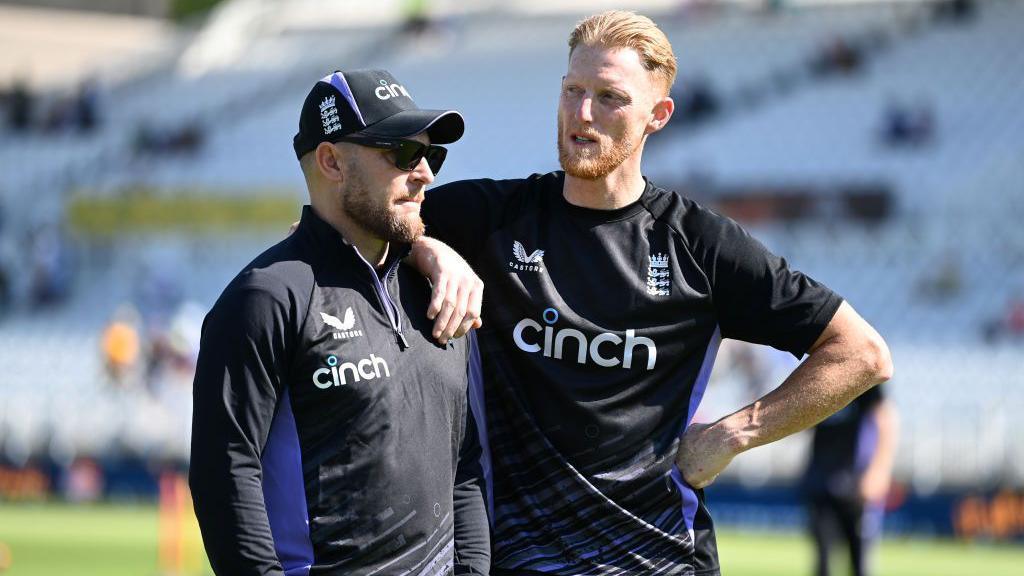Bazball to white-ball? Why England should give McCullum limited-overs job

Brendon McCullum (left) was appointed head coach of England's Test side in 2022
- Published
When the question was asked, Brendon McCullum did not dignify it with a response.
England had just won the third Test against West Indies. Matthew Mott was still white-ball coach, though his P45 was in the printer.
As it was put to McCullum that he might be able bring the limited-overs side under his Bazball wing, Baz bailed.
The New Zealander has been responsible for revitalising England’s Test cricket. On taking the job two years ago, he seemed a natural fit for the white-ball role, but said at the time he wanted more of a challenge than inheriting the best team in the world.
What better challenge now than combining the Test team’s quest for Ashes glory with a refresh of Jos Buttler’s stagnant outfit?
England split the head-coaching responsibilities because of a relentless and overlapping schedule deemed too much for one man.
However, just like when they tried the same thing 10 years ago, it can create a two-tier system. Realistically, the Test side ends up taking priority.
Also, as England managing director Rob Key pointed out to Sky Sports on Thursday, the schedule is easing ever so slightly. Once England are past Christmas there are far fewer instances in the coming years of them needing two teams at the same time.
Root hits record 34th century as England near win
- Published31 August 2024
Root is England's greatest batter - Vaughan
- Published31 August 2024
Looking at the way McCullum has transformed the Test side, it is not difficult to see the benefit he could bring to a white-ball team that have disappointed in two World Cups over the past year.
Firstly, the vibes. Once the epitome of free-spirited fun, England have gradually lost their smile, not least the increasingly uptight Buttler. McCullum has already shown himself to be cricket’s answer to Van Wilder.
Another huge plus is McCullum’s clear messaging. England’s white-ball decision-making has become muddled and there have been questions over Buttler’s tactical acumen. McCullum’s Test side have had success by keeping their plans simple.
It was Eoin Morgan, a man who knows a thing or two about building a team, and a great mate of both McCullum and Buttler, who said Key must speak to the Test coach about the white-ball job.
"I'm not sure McCullum has given it a lot of thought yet, but he should,” said Morgan in the aftermath of Mott’s exit. “From Rob Key's point of view he needs to make it attractive."
In terms of attractiveness, McCullum is already happy to tell anyone who will listen he has “the best job in the world”.
He is well paid, he has a lot of freedom and power and, because England’s Test cricket often falls into about three chunks across the year, McCullum’s schedule isn’t dissimilar to the franchise world he left behind.
His contract with England has around 18 months left to run, with the Ashes in Australia in 2025-26 predicted to be the end of the Bazball era. After the ongoing second Test against Sri Lanka, McCullum might only have one visit to Lord’s left with his England side.
Key could perhaps coax an extra two years out of McCullum, through to the home Ashes in 2027 and the next 50-over World Cup that immediately follows in South Africa, Zimbabwe and Namibia.
Clearly, there are practical hurdles to overcome when it comes to doubling the workload of a man who lives on the other side of the world.
But these issues would not be insurmountable with some careful managing of his schedule and load-sharing among England’s assistant coaches, with whom McCullum already has an excellent working relationship.
Take this winter, for example. Before Christmas, England have Test tours in Pakistan in October and a favourable trip from McCullum’s point of view to New Zealand in December. Sandwiched in between is a limited-overs tour to the Caribbean in November, which interim coach Marcus Trescothick may lead anyway if England don’t have a permanent plan in place by then.
In 2025, McCullum isn’t due to work for England for almost five whole months until the one-off Test against Zimbabwe in May. That is an opportunity to take charge for the Champions Trophy in Pakistan in the spring and the warm-up tour of India that precedes it.
As time moves on, obvious series and tours to give McCullum a break would arise. Not only that, giving chances to lead to the likes of Trescothick, Paul Collingwood and Andrew Flintoff can only be a good thing for an English game that has an appalling record in turning its very best players into top coaches.
At the moment, England are going through the process of finding a new white-ball supremo. There is no indication McCullum is being considered or would want it. If he were to assume responsibility for both teams, there is the risk of burning out one of English cricket’s most prized assets, even if the man himself is unflinchingly unflappable.
There are others who may want the job, too. Trescothick has not ruled himself out of the running and Sri Lanka batting legend Kumar Sangakkara called it “an exciting prospect”. Andy Flower, an Ashes-winning coach who was once the Test man in a job-split scenario, is one of the most sought-after leaders on the franchise circuit.
As it stands, there is a question for Key and England. They may already be in possession of the answer.
Related topics
- Published16 August
